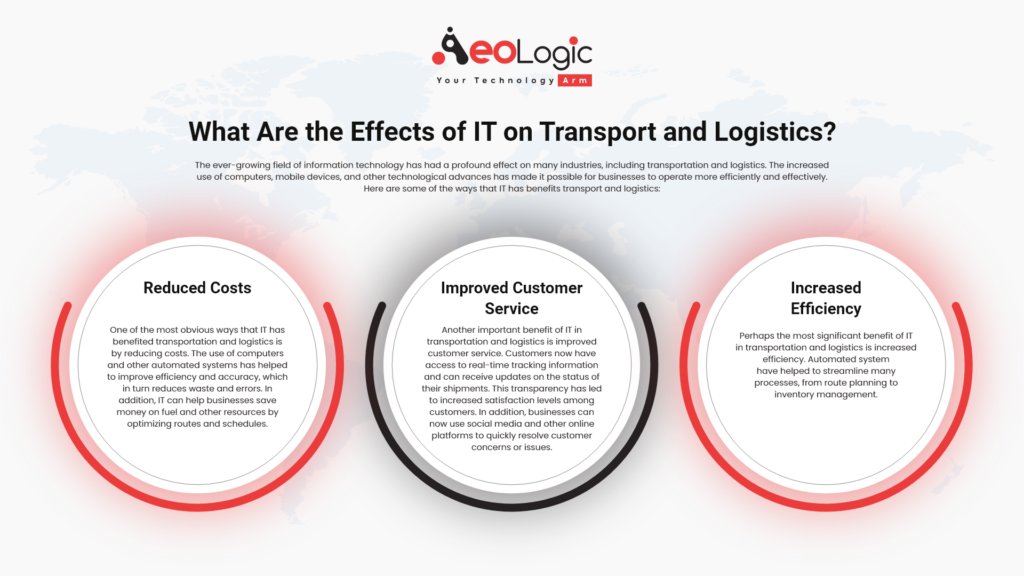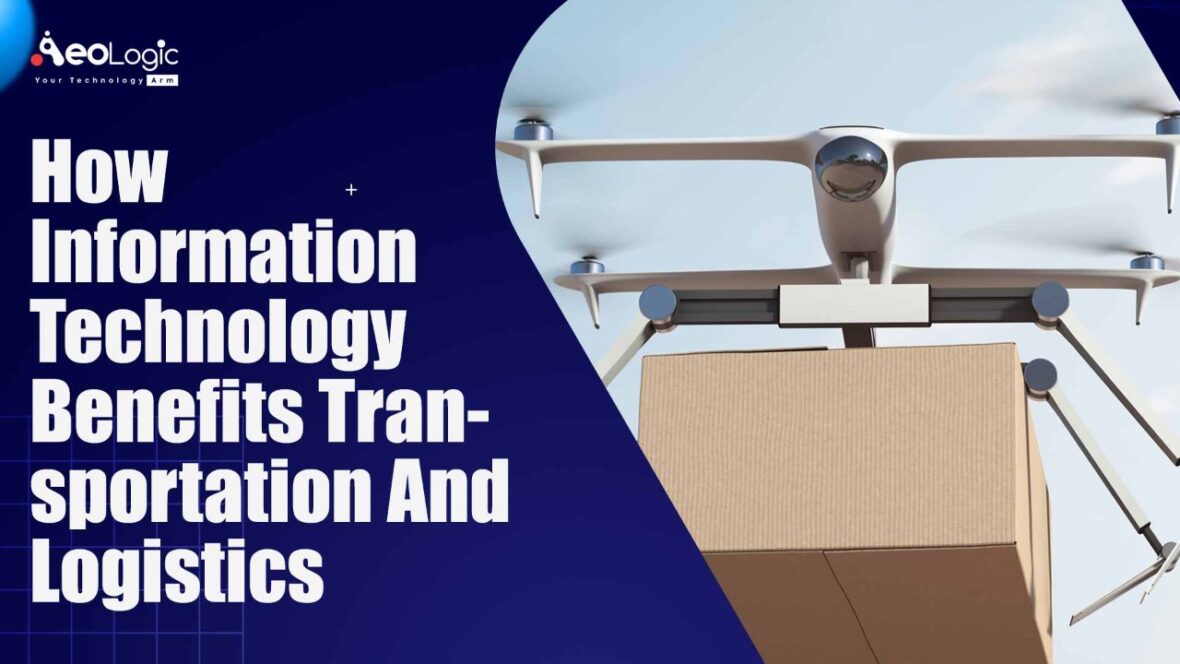Technological advancements have paved the way for even more efficient logistics in transportation and logistics. In this blog, we will discuss how information technology benefits transportation and logistics.
In today’s society, we have come to rely on Information Technology. It is not a question of if anymore, but when. The Internet has been a game-changer in the way people look for and use information. With the advent of the internet, many aspects of society and our economy have undergone radical changes. Transportation and logistics are just two industries that have benefitted tremendously because of how IT has enhanced their operations.
Let’s begin!
How Information Technology Benefits Transportation and Logistics
Information technology has transformed the transportation and logistics industry in recent years. By automating processes and improving communication, information technology has made shipping faster, cheaper, and more efficient.
In the past, coordination between different parts of the supply chain was a challenge. Information technology has helped to solve this problem by providing a platform for all stakeholders to share information and track shipments. This has led to a more seamless and efficient transportation system.
Also Read: Connected Technologies Improve Healthcare Delivery, Safety, and Efficiency
In addition, information technology has also helped to improve safety in the industry. By tracking shipments and providing real-time updates, information technology can help to prevent accidents and delays. This is especially important in the case of hazardous materials.
Overall, information technology has had a positive impact on the transportation and logistics industry. By making shipping faster, cheaper, and safer, information technology has made it possible for businesses to move goods around the world more easily than ever before.
The Importance of Data in Transportation and Logistics
Transportation and logistics are two industries that have been greatly impacted by the advancement of information technology. Data plays a crucial role in both industries, and IT has helped to make data more accessible and easier to manage.
IT has benefits for both transportation and logistics companies, as well as the customers they serve. Perhaps the most important benefit is the ability to track and manage data more effectively. This data can be used to improve efficiency and optimize operations. For example, GPS tracking systems allow companies to know the exact location of their vehicles at all times, which can help them to better plan routes and avoid traffic congestion.
Also Read: 10 Technologies Leading Digital Transformation In Retail
In addition, IT has made communication between businesses and their customers much easier. Customers can now track their shipments online, which gives them peace of mind and makes it easy to stay updated on the status of their orders. Businesses can also use email and social media to communicate with customers quickly and easily.
Overall, information technology has greatly benefited the transportation and logistics industries. The ability to track and manage data more effectively has led to increased efficiency, while improved communication has made it easier for businesses to provide excellent customer service.
How Do IT Systems Interact With Transportation?
IT systems can be used to track and manage transportation resources, help optimize routes and schedules, and monitor conditions in real-time. They can also provide information that can be used to improve safety and security.
In general, all transportation systems have three main components: vehicles, infrastructure (roads and rails), and information technology. The IT systems that support transportation are a vital part of the operations of the industry. They enable companies to make informed decisions, track and analyze data, and provide information to help with everything from navigation to delivery.
Also Read: Benefits of Automation in the Manufacturing Sector
What Are the Effects of IT on Transport and Logistics?

The ever-growing field of information technology has had a profound effect on many industries, including transportation and logistics. The increased use of computers, mobile devices, and other technological advances has made it possible for businesses to operate more efficiently and effectively. Here are some of the ways that IT has benefits transport and logistics:
Reduced Costs: One of the most obvious ways that IT has benefited transportation and logistics is by reducing costs. The use of computers and other automated systems has helped to improve efficiency and accuracy, which in turn reduces waste and errors. In addition, IT can help businesses save money on fuel and other resources by optimizing routes and schedules.
Improved Customer Service: Another important benefit of IT in transportation and logistics is improved customer service. Customers now have access to real-time tracking information and can receive updates on the status of their shipments. This transparency has led to increased satisfaction levels among customers. In addition, businesses can now use social media and other online platforms to quickly resolve customer concerns or issues.
Increased Efficiency: Perhaps the most significant benefit of IT in transportation and logistics is increased efficiency. Automated systems have helped to streamline many processes, from route planning to inventory management.
Disruption in Transportation and Logistics: Using Innovation to Foster Growth
The transportation and logistics industries are under pressure to meet the demands of a rapidly changing landscape. Rapid urbanization, the rise of e-commerce, and the need for greater sustainability are just a few of the challenges facing these industries. But as with any industry under pressure, there is an opportunity for growth. And that opportunity lies in innovation.
Also Read: How Businesses Can Innovate in Retail with Latest Technology
Innovation in transportation and logistics can take many forms, from new technologies and approaches to more efficient operations. But whatever form it takes, innovation is essential to meeting the challenges of the future and ensuring continued growth in these industries.
Some of the most promising areas for innovation in transportation and logistics include
Urban delivery: With more people living in cities, there is an increasing demand for last-mile delivery services. This presents an opportunity for transportation and logistics companies to develop new methods and technologies for urban delivery, such as electric vehicles, drones, and on-demand services.
E-commerce: The growth of e-commerce is transforming the way goods are shipped and delivered. This presents an opportunity for transportation and logistics companies to develop new methods and technologies for handling e-commerce orders, such as real-time tracking, optimized shipping routes, and same-day delivery
Future Implications for Transport and Logistics
The transport and logistics industry is under pressure to improve efficiency and cut costs. Information technology is playing an increasingly important role in helping companies to meet these challenges.
In the future, information technology is likely to have an even greater impact on the transport and logistics industry. For example, the use of sensors and other tracking devices will become more widespread. This will enable companies to track their vehicles and shipments more effectively, which will lead to improved efficiency and lower costs. In addition, the use of artificial intelligence (AI) and machine learning will become more prevalent. These technologies will help companies to automate various tasks, such as route planning and warehouse management. As a result, the transport and logistics industry is likely to become even more efficient and cost-effective in the future.
Conclusion
Information technology has revolutionized the transportation and logistics industries, making them more efficient and effective. By automating processes and tracking data, businesses can optimize their operations to save time and money. IT also helps companies stay compliant with regulations and keep track of inventory levels. In addition, information technology can help businesses improve customer service by providing real-time updates on shipments. Overall, information technology is a critical part of running a successful transportation and logistics business.
Feel free to schedule a free 60-minute consultation with one of our experts. We’ll talk about the opportunities and address any concerns you may have. Our consultants will come up with ideas and explain how they can help you. Let’s talk!
Aeologic Technologies is a great place to start!







